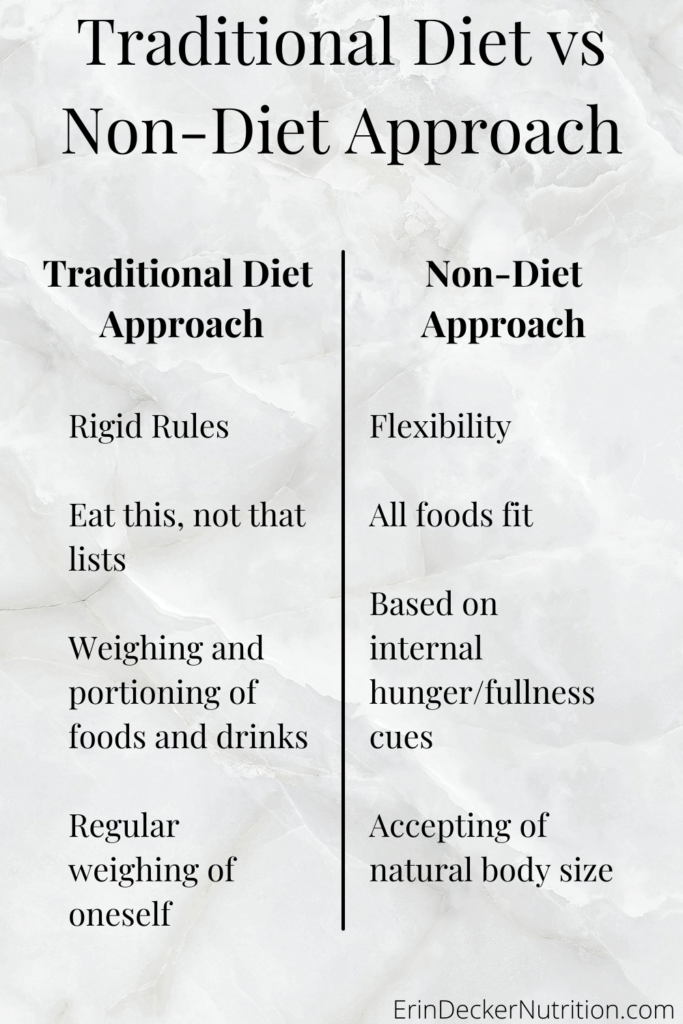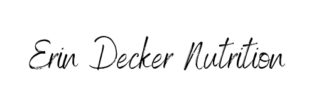These days, diet culture shows up everywhere. It’s featured in TV and internet ads, the medical field when doctors perform bariatric surgery, pop culture when celebrities are praised for weight loss, and in everyday life through weight bias. It causes harm because it hides behind a wall of “being healthy”, e.g. healthism. A non-diet approach, on the other hand, is a way to tune into your body and focus on health and wellbeing, without the pressure of changing your body.
In this blog post, Kourtney Johnson, LD, will discuss the role of healthism in diet culture, and explore diet culture vs a non-diet approach.
What is Diet Culture?
Diet culture is a system of beliefs that values thinness above all else. It prioritizes and normalizes calorie counting, talking negatively about yourself and categorizing foods as “good” or “bad.”
Diet culture, as opposed to a non-diet approach, promotes the idea that weight loss is the key to health and happiness, and that people who are overweight or obese are unhealthy and morally flawed. This falls under the realm of “healthism”.
“Healthism” and Diet Culture
Diet Culture is often connected with “healthism,” which is the idea that health is the most important journey in life. It suggests that your health is your own responsibility and everything is in your control. It puts blame on your behavior and choices and makes you feel ashamed for not eating “right” when your attempt inevitably fails.
Healthism doesn’t consider how biological, psychological, cultural and sociological factors impact health. Examples of these factors include poverty, lack of access to healthcare, fatphobia, trauma and racism. Because health is tied to smaller bodies in our society, dieting is socially accepted as a way to achieve a certain body size while demonstrating your own discipline.
Examples of Healthism
The way we speak can reflect healthism. Harmful examples include:
- Self-deprecating remarks like “I’m so bad for eating that cookie”
- Comments about someone’s body
- Assuming the approach you used will work for everyone
- Feel the need to “earn” your food through dieting or exercise
You are embodying healthism when you engage in examples such as these. However, these behaviors are normalized in our society, because we are constantly receiving messages that this is the “right” way to act.
Healthism also shows up when people act concerned about someone’s health because of their weight. This equates weight with health, despite research showing several confounding variables that could explain the correlation, such as weight stigma and the effects of weight cycling.
In addition, this set of beliefs not only affects people in larger bodies; it also impacts people in marginalized communities, such as when they have medical conditions, which must imply they are “lazy” or “irresponsible.” Healthism maintains ableism as well when, for example, someone makes a joke about getting diabetes simply from eating sugar.
Healthism takes our health, something incredibly complex, and pares it down to something that we believe is entirely in our control.
Don’t get me wrong; there are behaviors that you can engage in that support better health! But before making drastic changes, consider how you can challenge these biases for the better of your own health and others.
Risks of Diet Culture
I often hear from clients that they want to improve their health by focusing on their diet and lifestyle. This is TOTALLY acceptable and I generally support it 100%. However, it is important to consider that “dieting” is not risk free, especially if you find yourself engaging in extreme or unsupported behaviors.
Risks of these behaviors include:
- Eating disorders
- Body image issues
- Low self-esteem
- Anxiety and depression
- Obsession with food and exercise
- Weight cycling (repeatedly gaining and losing weight)
- Physical health problems
A non-diet approach to health provides many of the “advertised” benefits of diet culture, but without the stigma or risks.
A Non-Diet Approach to Health
In contrast to Diet Culture and healthism, a non-diet approach puts emphasis on self-acceptance, weight-inclusivity and Intuitive Eating. It looks at health as an overall picture that involves mental, physical and emotional health.
A non-diet approach does not focus on weight. Instead, it encourages you to develop a healthy relationship with your body and food. This means you use your hunger and fullness cues, as well as satisfaction around food, to determine what, when and how much to eat instead of using external cues. External cues include eating only at certain times, deciding what to eat based on calories and avoiding certain foods because you believe they are “bad.”
When taking a non-diet approach to health, you’ll need to unlearn and learn different behaviors and beliefs. This is where working with a non-diet dietitian, such as Erin, can be helpful. When you begin the process of rejecting Diet Culture’s beliefs, embracing your body and practicing Intuitive Eating, it’s normal to have difficulty and need guidance. After all, these steps go against what we hear from society, so it’s beneficial to have someone who “gets it” in your corner!

Benefits of a Non-Diet Approach
People who engage in Intuitive Eating are less likely to binge eat, are more likely to consume a larger variety of foods, they possess higher self-esteem and have better psychological health.
Intuitive Eating is also associated with improved cholesterol levels, decreased rates of depression and anxiety and increased body satisfaction. That’s right – you can eat intuitively even if you have certain health conditions!
Research also shows that a non-diet approach might more effectively promote permanent behavior changes regarding exercise and food intake compared to an approach that focuses on weight.
Next Steps
If you are interested in having a professional guide you through the steps of using a non-diet approach to health, Erin is available to help you! Connect with her today.
